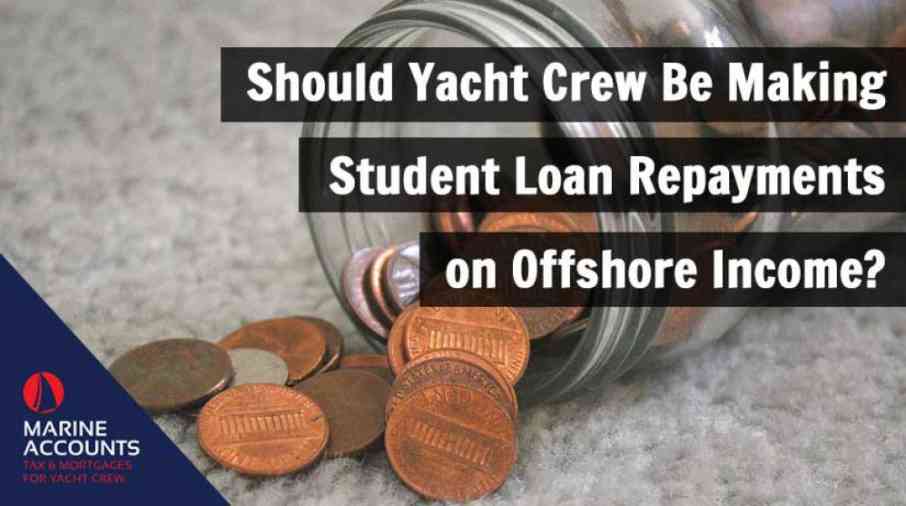When am I liable to repay my UK student loan while working aboard a ship overseas?
- Authors
-
-

- Name
- Patrick Maflin
-

Once again, we delve into a common concern among UK seafarers, "When am I liable to repay my UK student loan while working aboard a ship overseas?" Understanding the Seafarers Earnings Deduction (SED) in the UK is crucial in deciphering this query. In this piece, we aim to demystify any confusion surrounding your obligation to commence student loan repayments while engaged in maritime duties abroad.
If your income is yet to be declared to HMRC via a self assessment, we would strongly advise doing this as your first course of action. You can start this process by clicking on the link below:
If you need further assistance with filing then please contact us, so we can guide you through the process.
Plan 1 or Plan 2 Loan?
The initial inquiry on your UK self-assessment tax return is determining whether you're under a Plan 1 or Plan 2 loan. These loans contrast primarily in minimum income triggering repayments and the duration of repayment before loan forgiveness. While several factors come into play, a simple guideline exists:
Plan 1 loans are typically forgiven after 25 years (35 years in Scotland).
Plan 2 loans are forgiven after 30 years.
Identifying your loan plan is relatively straightforward. If you commenced your studies in England or Wales after September 1st, 2012, you're likely repaying a Plan 2 loan; otherwise, it's a Plan 1 loan.
How Much Do I Need to Repay?
Repayment of student loans is contingent upon your net taxable income, which reflects the taxable portion of your earnings. Therefore, eligibility for the Seafarers Earnings Deduction (SED) plays a significant role in determining your repayment responsibility. Currently, declaring all employment income under the SED, without additional income sources, exempts you from student loan repayments. This exemption arises because income from offshore work is deemed an allowable expense, resulting in a net taxable income of £0. While repayments are not obligatory, it's crucial to recognise that your loan accrues interest daily, and voluntary repayments are available as an option.
Conversely, if SED ineligibility arises or you possess income unaccounted for under SED, repayments become necessary, with set thresholds based on your loan plan. Thresholds are annually adjusted and align with the tax year (April 6th to April 5th). For the tax year 2022/2023 thresholds were as follows:
Plan 1: £22015, with a 9% repayment rate on taxable income exceeding this amount.
Plan 2: £27295, with a similar 9% repayment rate on income surpassing this threshold.
How Do I Make Repayments?
For onshore employment subject to PAYE taxation, employers typically deduct student loan repayments. If not, requesting deduction is advisable, ensuring documented proof of compliance. However, for crew members employed by foreign entities, this automatic deduction may not apply. In such cases, completing an 'Overseas Income Assessment Form' and submitting it to the Student Loans Company is prudent. Subsequently, they'll outline owed repayments and offer payment options.
We have a proven track record of successfully obtaining repayment calculations from SLC. If you desire to request a modification to your payment plan, we can provide a letter template for your convenience, which you can fill out and send to them.
Should SLC require additional information or contest your repayment calculation, we can handle communication directly with them on your behalf and pursue further correspondence as needed. Please note that this service incurs a fee of £99. It is also important to remember that although you may not have a tax liability, HMRC still expect you to notify them of your income and your qualification for the SED through an annual tax return. If you any queries relating to your SED status please do get in touch with us and we will be very happy to assist. You can also take our free SED here:
It's prudent to be mindful that while your loan remains unpaid, it continues to accrue interest. This means that even during periods of deferment or when repayments are not being made, the outstanding balance of your loan grows over time due to the accumulating interest. It's an important aspect to consider when managing your student loan debt, as the longer you defer repayment, the more interest you'll ultimately pay in addition to the principal amount borrowed.
The current rates are as follows:
6.25% if you’re on Plan 1
7.7% if you’re on Plan 2
6.25% if you’re on Plan 4
7.7% if you’re on Plan 5
If you would like to speak with us regarding our SLC template, you would like us to contact SLC on your behalf, or you have any questions about issues raised in this article, please get in touch with us at [email protected].


